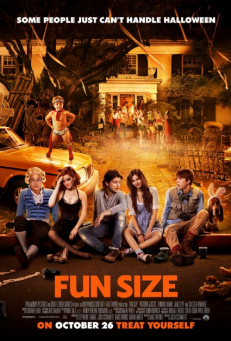Print Edition: October 31, 2012
 In deviation from contained, swift narratives of progression, television series often stretch character tribulations into fractured, yet seemingly real time. The passage of years lends a fabricated credibility to the agonizingly slow, repetitive demonstration of the process of falling in love in Friends or How I Met Your Mother, or the same for Josh Schwartz, directing for the first time here, and his stories of young people in The O.C. and Chuck. Part of the appeal is in how individual quirks or flaws are given a running time all to their own, with a mini-resolution for each episode to not quite add up to a whole at season’s end. Rather than the dream of a film romance it is a corner of a fragment of reality, and these two conflicting approaches are found pieced together in Fun Size.
In deviation from contained, swift narratives of progression, television series often stretch character tribulations into fractured, yet seemingly real time. The passage of years lends a fabricated credibility to the agonizingly slow, repetitive demonstration of the process of falling in love in Friends or How I Met Your Mother, or the same for Josh Schwartz, directing for the first time here, and his stories of young people in The O.C. and Chuck. Part of the appeal is in how individual quirks or flaws are given a running time all to their own, with a mini-resolution for each episode to not quite add up to a whole at season’s end. Rather than the dream of a film romance it is a corner of a fragment of reality, and these two conflicting approaches are found pieced together in Fun Size.
After receiving invitation to the hottest guy in Cleveland’s house party despite claims she didn’t stand a chance at attracting his attention, Wren (Victoria Justice) has her night complicated with the escape of her candy-carrying little brother into a crowd of unknowns.
For the teenagers of Fun Size, there is nothing more terrifying than the merging of public and private lives – through Facebook, broken social circles and on that most liminal of nights, Halloween. October 31 is supposed to be a clear separation – partying without true faces, action without repercussion, reward without effort, but, perhaps predictably, none of these prove to be the case.
Schwartz’s television impulses step in constantly, whether it’s the opening (establishing shot montage! character establishing voiceover!) or the end (“funny” outtakes from the wise-ass sidekick!). Using scope framing, but not really using it, Fun Size is indistinguishable from other direct, but inexpressive weekly efforts – the expected ladling out of Schwartz’s soundtrack selections from the past year only furthers this connection. Throwaway gags and exciting if-you’re-seeing-this-for-the-first-time antics (and if you’ve seen American Graffiti, Sixteen Candles, or any other single night of teen vehicular freedom movie, you won’t be) dominate, but the centrepiece in any Schwartz-run fling, despite narrative checkpoints, is the emotion (or is it sentimentality?) at the core of his characters.
What defines the humour in Fun Size is a kind of cheerful avoidance of anything too sincere. It begins in the way each of the teens present themselves – smart and funny, but not wanting to be too quick of thought, and knowledgeable about the past, but definitely not theirs. Cultural references in costume ideas turn from personal touchstones to weight deflected, robbing images of specificity and speech of salience: “This is really meaningful to me, but, uh, yeah, whatever.” Whenever the movie turns toward an occasional emotional stab, two things are certain: the growth of unwanted generic score and the deflation of tired “wit.”
What Schwartz delights in is turning the grounded into the slightly exaggerated: windblown entrances, the unuttered blurted out, overactive minds uninterrupted. Though this isn’t written by Schwartz, it’s easy to see his hand in the way a semi-grandiose plan is hatched or a nervous underachiever sees opportunity open. Thomas Mann’s “nice guy” Roosevelt is in many ways Schwartz’s typical protagonist (and Thomas Middleditch plays a similar role), with Chuck Bartowski being closest cousin (or future). In a movie populated too frequently by stereotypes and missing laughs, this is where Schwartz finds something to hold onto.
Fun Size doesn’t add much of anything to the Halloween tradition, and in its (thankfully tangential) revisions adds only blasé understanding to the racism of Sixteen Candles and middle-America misanthropy of Sideways. But there is a flicker of what Schwartz brought to television, and why Fun Size, though not able to stand on its own, points to possible futures. For its theatrical screenings, Fun Size is preceded by an “exclusive premiere” of the music video for Carly Rae Jepsen’s “This Kiss,” and taken from that is the idea of digital skipping as trepidation, not wanting something to end but knowing it must. Schwartz’s own past creations could attest to whether it’s the build-up to a first kiss or a first brush with the role of director, in lieu of greatness, what’s most important is what comes after.


